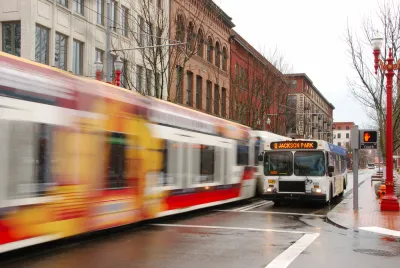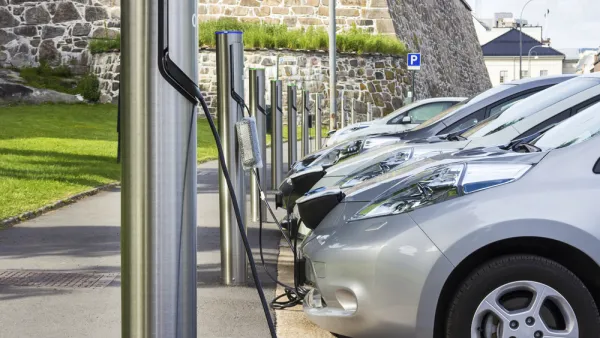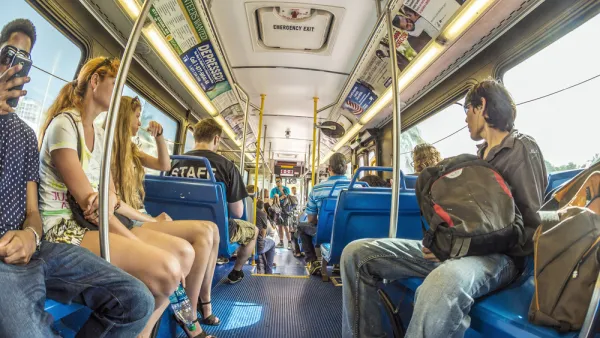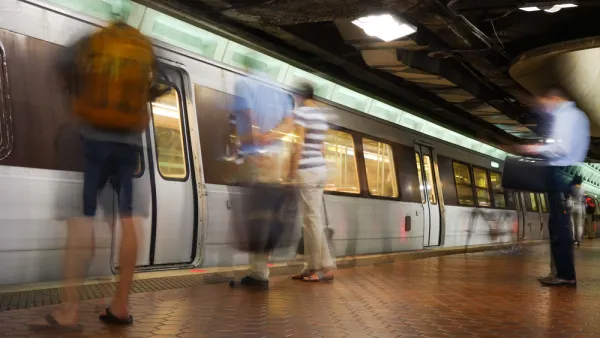The federal government can encourage public transit use and electrification through reforms in transportation systems and land use policies.

As climate change intensifies, writes Kevin DeGood, "[t]he United States must adopt policies and make investments to achieve net-zero GHG emissions by midcentury." Two important steps: "electrifying vehicles and reducing the automobile dependence of communities," which includes "[r]apid electrification of transportation powered by renewable energy."
"In addition to electrification, the federal government needs to substantially reform its transportation policies to reduce auto dependence by directing funds to projects that expand transportation choice—including transit, biking, and walking—and encourage infill development," says DeGood. "Climate change cannot be addressed without reforming land use, and land use cannot be changed without reforming transportation."
The design of transportation systems "has important implications for not only driving and mobile emissions but also the economic productivity of those facilities and the long-term cost burden associated with maintenance." DeGood compares Ohio and Washington, D.C.'s systems: "every lane mile of roadway in Washington, D.C., supports, on average, 4 1/2 times as many residents as in Ohio. … Stated differently, every dollar spent on building and maintaining the roadway network in Washington is providing a larger economic return on investment than the equivalent dollar spent in Ohio." Yet "83 percent of Ohio adults drive to work alone, while only 4 percent take transit, bike, or walk. In Washington, only 34 percent of residents drive alone, while 53 percent take transit, bike, or walk."
"Congress is currently debating the reauthorization of federal highway, transit, and passenger rail programs. The U.S. House of Representatives has passed the INVEST Act, which contains several key policy reforms to address climate change and improve overall system performance." The act, writes DeGood, could be "a strong step in a new direction, pushing states and regions to make different, more sustainable, and more productive investments with federal dollars."
FULL STORY: To Tackle Climate Change, We Must Reform Land Use

Analysis: Cybertruck Fatality Rate Far Exceeds That of Ford Pinto
The Tesla Cybertruck was recalled seven times last year.

National Parks Layoffs Will Cause Communities to Lose Billions
Thousands of essential park workers were laid off this week, just before the busy spring break season.

Retro-silient?: America’s First “Eco-burb,” The Woodlands Turns 50
A master-planned community north of Houston offers lessons on green infrastructure and resilient design, but falls short of its founder’s lofty affordability and walkability goals.

Test News Post 1
This is a summary

Analysis: Cybertruck Fatality Rate Far Exceeds That of Ford Pinto
The Tesla Cybertruck was recalled seven times last year.

Test News Headline 46
Test for the image on the front page.
Urban Design for Planners 1: Software Tools
This six-course series explores essential urban design concepts using open source software and equips planners with the tools they need to participate fully in the urban design process.
Planning for Universal Design
Learn the tools for implementing Universal Design in planning regulations.
EMC Planning Group, Inc.
Planetizen
Planetizen
Mpact (formerly Rail~Volution)
Great Falls Development Authority, Inc.
HUDs Office of Policy Development and Research
NYU Wagner Graduate School of Public Service




























